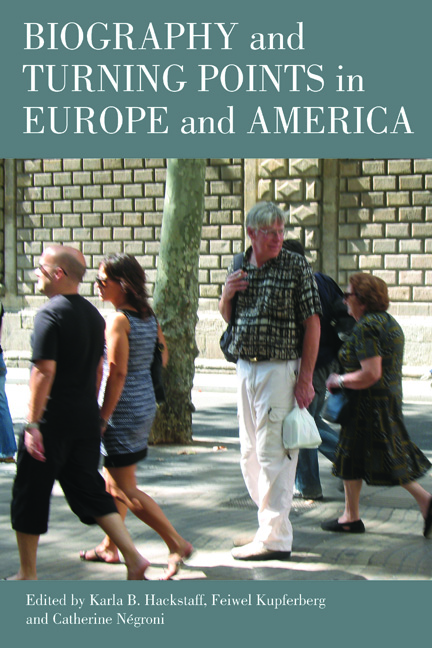Book contents
- Frontmatter
- Contents
- Notes on contributors
- Introduction: Advancing the dialogue on turning points
- one Unpacking biographical narratives: investigating stories of artistic careers in Northern Jutland, Denmark
- two Turning points in the life course: a narrative concept in professional bifurcations
- three Conjugal separation and immigration in the life course of immigrant single mothers in Québec
- four Migration biography and ethnic identity: on the discontinuity of biographical experience and how turning points affect the ethnicisation of biography
- five Biographical structuring through a critical life event: parental loss during childhood
- six Decisive turning points in life trajectories of violence among young men in the barrios of Caracas: the initiation and biographical reconversion to non-violent lifestyles
- seven The turning points of the single life course in Budapest, Hungary
- eight Complicating actions and complicated lives: raising questions about narrative theory through an exploration of lesbian lives
- nine Religious conversion as a biographical turn/ing: the case of Orthodox believers in contemporary Russia
- ten Conclusion: theorising turning points and decoding narratives
- Index
eight - Complicating actions and complicated lives: raising questions about narrative theory through an exploration of lesbian lives
Published online by Cambridge University Press: 01 September 2022
- Frontmatter
- Contents
- Notes on contributors
- Introduction: Advancing the dialogue on turning points
- one Unpacking biographical narratives: investigating stories of artistic careers in Northern Jutland, Denmark
- two Turning points in the life course: a narrative concept in professional bifurcations
- three Conjugal separation and immigration in the life course of immigrant single mothers in Québec
- four Migration biography and ethnic identity: on the discontinuity of biographical experience and how turning points affect the ethnicisation of biography
- five Biographical structuring through a critical life event: parental loss during childhood
- six Decisive turning points in life trajectories of violence among young men in the barrios of Caracas: the initiation and biographical reconversion to non-violent lifestyles
- seven The turning points of the single life course in Budapest, Hungary
- eight Complicating actions and complicated lives: raising questions about narrative theory through an exploration of lesbian lives
- nine Religious conversion as a biographical turn/ing: the case of Orthodox believers in contemporary Russia
- ten Conclusion: theorising turning points and decoding narratives
- Index
Summary
Introduction
As all storytellers do, investigators face audiences when they present analytic stories. (Riessman, 2008, p 184)
In this chapter I present my own investigator's story, my version of the stories gifted to me as part of a research study into lesbian experiences of social exclusion and mental well-being, and my interpretation of narrative analysis and the use of turning points in narrative. It is a story that, through the process of development, has been presented to different audiences in different formats, received and interpreted differently by each new audience and consequently reinterpreted. The aim here is two-fold: to demonstrate how turning points provide a useful focus of analysis in research that seeks to explore the interaction between public and private discourses and identity, and to raise questions about narrative theory more broadly and the use of turning points in particular.
This chapter is essentially a discussion of the process of narrative analysis set within a framework of one example of narrative research. The research focused on exploring the lives of lesbians with three main aims: to question whether or not social exclusion was a concept that had relevance to the lives of lesbians, to explore how social exclusion had an impact on the experience of lesbians, with particular emphasis on mental health and well-being, and finally, to consider what types of discrimination contributed to these exclusionary processes. In so doing the research was concerned with the intersections between notions of gender, sexuality and mental well-being.
Research methodology
Riessman suggests that narrative is varied because of the range of narrative investigators who ‘rely on diverse theories and epistemologies’ (2008, p 17). The ontological and epistemological drivers of this research were essentially two-fold: adopting a material discursive theoretical framework (Ussher, 1997) and approaching the research from a feminist epistemological standpoint.
A material discursive framework is one that seeks to combine what are sometimes seen as competing theoretical perspectives: social constructionism and realism. Both gender and sexuality have been discussed with regard to essentialist and social constructionist theories; however, adopting a purely constructivist or a purely essentialist approach may be problematic as both have resonance to a study of lesbian experiences. Similarly, in relation to mental health, both social constructionist and social causation theories have value.
- Type
- Chapter
- Information
- Biography and Turning Points in Europe and America , pp. 187 - 206Publisher: Bristol University PressPrint publication year: 2012

